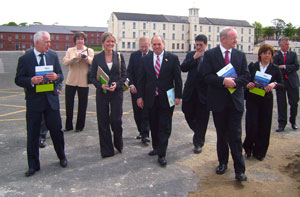4 September 2008 Edition
Building a better future for Derry

EBRINGTON: There are a number of key sites with the potential to create jobs
OPINION Derry’s regeneration must benefit all of the people
BY MARTINA ANDERSON, MLA for Foyle
LET ME give you a scenario. Imagine you were a high-flier in a huge multinational corporation and you had, say, a billion pounds to spend on a massive building project. At the beginning of the project, your superiors give you a specification about what they want you to build and what it should achieve.
Now imagine you decided to go ahead and spend all that money by building something entirely different.
Now let me ask you a question: do you think you would remain a high-flier in that company for long? Of course not. But that is exactly what has been happening in countries across the world - including our own - for generations.
Each year, governments spend huge sums of public money on a vast array of services, building projects and countless other initiatives.
However, this money has rarely been utilised in the way it should have been - to benefit the citizens which those same governments have been elected to serve.
A case in point is the regeneration of the Gasworks site in south Belfast. This project was supposed to revitalise the neighbouring areas of high deprivation such as the Markets and Donegall Place. It singularly failed to do so.
Yes, there were lots of shiny new office blocks built and thousands of jobs created but literally only a handful of those jobs went to people from the areas that were supposed to benefit.
Failures such as this are intolerable and that is why Sinn Féin fought for new public procurement guidelines to be implemented to prevent disasters like that from ever happening again.
These guidelines - which were signed off earlier this year - are now official policy and all of us must ensure they are utilised to their maximum effect.
And when you consider the billions which the Executive has committed to spending over the next decade, the potential benefits are startling.
In practice, the guidelines will mean that every contractor bidding for a Government tender would be required to demonstrate how they intend to include social objectives in their workplan.
The key objectives they would be expected to include are:-
- Employment of the long-term unemployed;
- Apprentice training;
- Health and safety best practice;
- Prompt payment of sub-contractors;
- Environmental measures such as the use of sustainable materials, etc.
All of this has been informed by a 2002 pilot project carried out by the Central Procurement Directorate (CPD).
This pilot included a condition compelling the contractor to hire a certain percentage of their workforce from the long-term unemployed. This was known as an ‘Employment Plan’.
Although the pilot was on a relatively small scale, it was a resounding success, leading to the recruitment of 51 new employees from the target group.
Just imagine what could be achieved if those principles were translated into a much bigger project such as Fort George in Derry?
Indeed, I believe that nowhere are the conditions more suitable for the procurement guidelines to be implemented successfully than the North-West..jpg) Because, while the Derry City Council area has some of the highest unemployment and deprivation rates seen anywhere in the North, we are also set to benefit from some of the largest public procurement projects ever witnessed here.
Because, while the Derry City Council area has some of the highest unemployment and deprivation rates seen anywhere in the North, we are also set to benefit from some of the largest public procurement projects ever witnessed here.
As well as Fort George, there is Ebrington, Rosemount, other key sites in the city centre, and the £1 billion of investment in Derry’s transport infrastructure which has already been confirmed by Regional Development Minister Conor Murphy.
So make no mistake, the potential in this region is huge.
In Fort George alone, it has been claimed that up to 3,000 jobs could be created.
If just 20 per cent of those workers were recruited from the long-term unemployed in the city, that would equate to 600 jobs for people who otherwise would have had little or no hope of entering the labour market.
Pre-recruitment training schemes would also be established in disadvantaged communities so as to arm people with the necessary skills to secure employment within the private companies that will eventually locate in place such as Fort George and Ebrington.
But what must happen now is for the public demand and political will to be created to transform these aspirations into a reality.
All of us who are interested in the regeneration of this city and region must work together to ensure the procurement guidelines are implemented properly, because while the potential is huge, the consequences of failure are dire.
This is a point which was hammered home by a keynote study carried out by Oxford University and Price Waterhouse Coopers last year.
The Oxford Economics Labour Market Study concluded that - if current patterns continue - Derry’s economy could thrive but the disadvantaged and the unemployed would continue to be left behind. It stated:
“The risk that the steady growth projected in our demand forecasts will leave large portions of the labour market without any noticeable improvement in their fortunes is an alarming and unsatisfactory outlook for Derry.”
We cannot allow that to happen.
Thankfully, in the procurement guidelines, we have an important tool to prevent Derry overseeing a failure like the Belfast Gasworks.
So let’s use it. And let’s build the better future which all of our people deserve.


